Offshore Company Formation: Structure Your Service Past Borders
Offshore Company Formation: Structure Your Service Past Borders
Blog Article
Approaches for Cost-Effective Offshore Company Formation
When thinking about overseas company development, the quest for cost-effectiveness becomes an extremely important worry for businesses looking for to increase their procedures internationally. In a landscape where financial carefulness preponderates, the approaches utilized in structuring offshore entities can make all the difference in achieving financial effectiveness and operational success. From navigating the intricacies of jurisdiction choice to carrying out tax-efficient structures, the trip towards establishing an offshore existence is rife with chances and challenges. By discovering nuanced approaches that mix lawful conformity, monetary optimization, and technical improvements, services can start a course in the direction of offshore company development that is both financially prudent and strategically noise.
Picking the Right Territory
When establishing an offshore business, selecting the ideal territory is an essential decision that can dramatically influence the success and cost-effectiveness of the formation process. The jurisdiction chosen will certainly establish the regulative structure within which the company runs, impacting taxation, reporting demands, personal privacy laws, and overall organization adaptability.
When picking a territory for your overseas business, several factors need to be thought about to ensure the choice aligns with your critical objectives. One crucial aspect is the tax program of the territory, as it can have a significant influence on the company's productivity. Additionally, the level of regulative conformity required, the economic and political security of the territory, and the convenience of operating needs to all be assessed.

In addition, the reputation of the jurisdiction in the international business neighborhood is essential, as it can affect the assumption of your firm by clients, companions, and banks - offshore company formation. By thoroughly assessing these factors and seeking specialist suggestions, you can select the ideal territory for your overseas company that maximizes cost-effectiveness and supports your business objectives

Structuring Your Business Efficiently
To make sure ideal effectiveness in structuring your overseas firm, thorough interest must be provided to the business structure. By developing a transparent ownership framework, you can make certain smooth decision-making procedures and clear lines of authority within the company.
Following, it is important to think about the tax obligation ramifications of the chosen structure. Various territories provide differing tax obligation advantages and rewards for overseas companies. By carefully evaluating the tax obligation regulations and policies of the chosen territory, you can maximize your company's tax effectiveness and decrease unnecessary costs.
Additionally, keeping appropriate paperwork and records is essential for the efficient structuring of your offshore company. By keeping up-to-date and exact documents of economic transactions, corporate decisions, and compliance documents, you can ensure openness and accountability within the company. This not only facilitates smooth operations however also helps in demonstrating conformity with governing needs.
Leveraging Innovation for Financial Savings
Reliable structuring of your offshore business not just rests on meticulous focus to business structures however likewise on leveraging technology for financial savings. In today's digital age, innovation plays a pivotal function in improving processes, lowering prices, and raising performance. One way to take advantage of innovation for financial savings in overseas business formation is by making use of cloud-based services for information storage and partnership. Cloud technology removes the demand for costly physical infrastructure, lowers maintenance costs, and supplies versatility for remote work. In addition, automation devices such as electronic trademark systems, accounting software, and task management systems can substantially minimize hands-on labor expenses and improve total productivity. Welcoming on-line interaction tools like video conferencing and messaging applications can additionally result in set you back financial savings by lowering the need for travel costs. By incorporating technology strategically into your offshore firm formation procedure, you can achieve substantial cost savings while boosting functional efficiency.
Minimizing Tax Obligation Obligations
Making use of tactical tax preparation strategies can effectively decrease the economic concern of tax obligation obligations for overseas business. One of the most common techniques for reducing tax obligation responsibilities is with profit moving. By dispersing earnings to entities in low-tax jurisdictions, offshore business can legitimately reduce their total tax obligation obligations. In addition, capitalizing on tax obligation rewards and exemptions offered by the territory where the offshore firm is signed up can result in significant cost savings.
One more strategy to reducing tax obligation liabilities is by structuring the overseas company in a tax-efficient way - offshore company formation. This entails very carefully designing the ownership and functional structure to enhance tax obligation benefits. For example, establishing a holding firm in a jurisdiction with positive tax obligation legislations can aid combine profits and decrease tax obligation exposure.
Additionally, staying upgraded on global tax obligation regulations and compliance demands is critical for decreasing tax obligations. By making certain rigorous adherence to tax obligation laws and policies, offshore business can prevent expensive fines and tax obligation disagreements. Looking for specialist advice from tax consultants or legal experts focused on worldwide tax matters can also offer useful understandings into efficient tax planning strategies.
Guaranteeing Compliance and Risk Reduction
Applying durable conformity procedures is necessary for overseas companies to reduce risks and keep regulative adherence. Offshore territories typically deal with raised examination due to concerns pertaining to money laundering, tax evasion, and various other economic criminal offenses. To guarantee compliance and minimize dangers, offshore firms must conduct comprehensive due persistance on clients and business companions to avoid involvement address in immoral activities. Additionally, applying Know Your Client (KYC) and Anti-Money Laundering (AML) procedures can assist verify the authenticity of transactions and guard the business's reputation. Routine audits and reviews of economic records are critical to determine any kind of irregularities or non-compliance concerns promptly.
Furthermore, staying abreast of transforming regulations and legal needs is essential for overseas firms to adapt their compliance methods accordingly. Involving legal professionals or conformity professionals can provide important support on browsing intricate governing landscapes and ensuring adherence to worldwide requirements. By focusing on conformity and danger reduction, overseas business can boost openness, construct trust fund with stakeholders, and safeguard their procedures from potential lawful effects.
Conclusion

Making use of strategic tax planning techniques can effectively lower the financial problem of tax responsibilities for overseas companies. By distributing profits to entities in low-tax jurisdictions, offshore companies can legally reduce their total tax obligation obligations. Additionally, taking advantage of tax obligation incentives and exceptions supplied by the territory where the overseas business is registered can result in considerable cost savings.
By making sure stringent adherence to tax legislations and policies, offshore firms can stay clear investigate this site of pricey charges and tax disputes.In conclusion, affordable offshore firm development needs cautious consideration of jurisdiction, efficient structuring, technology utilization, tax minimization, and compliance.
Report this page